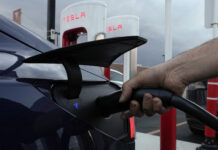
Bakodo is a bar code scanner – traditional or QR codes – for smart phones that allows consumers to see reviews, information and compare prices for more than 12 million items.
Andrés Douglas Castroviejo, founder of Bakodo, graduated from Brown University with a Bachelor of Science in mathematics and computer science in 2009.
His journey to found the startup, though, reaches farther afield than the average recent graduate. Born in Texas, Douglas then moved to Spain, where he perfected his fluency in Spanish as well as Gallego, Catalan and Portuguese, only to study in Wales at the United World College of the Atlantic.
At Brown, Douglas worked as a teaching assistant and a lab consultant for several years while pursuing his own developer interests on the side.
His first foray into entrepreneurship came his sophomore year in college. He devised the monetization strategy for Mocha, an online course scheduling application with widespread use at Brown University,
After interning at Google in New York and Apple in California, it was time to start something of his own. Bakodo was selected as a finalist in the entrepreneur track of the 2010 Rhode Island Business Plan Competition and first launched its iPhone app in the Apple Store in June 2010.
Since then, the barcode-scanning app has caught the eye of ABC News, and Mashable even gave it the thumbs up in its “Spark of Genius” series.
Providence Business News caught up with Andrés to find out what “love at first scan” really is.
PBN: Bakodo sounds like a really great tool for consumers as well as retailers. How many times do you pick up a tech gadget and think, is this really the one I want? What if there’s a better one out there?
DOUGLAS: Yes, it was something like that, although it happened a lot more frequently, not just with tech gadgets. It all started when I was a college student and had to be very careful with how I spent my money. Every penny counted, so I had to make sure that I was buying what I needed and that it was worth the money. I’m a very passionate about what I do and usually think thoroughly whether I should be doing it or not. I approach shopping similarly: I’m the antithesis of a retailer’s model shopper, since I am not at all impulsive. My instinct is to wonder whether there is something better out there at a better price. The answer is usually yes, and it is usually online.
As mobile phones became more capable … the idea of Bakodo started forming. The development of a higher quality camera capable of scanning barcodes was the last missing piece to make it all possible.
I agree that this seems like the ultimate opportunity for retailers. Someone is looking for a product nearby, and you, as a retailer, can show them that you have it. It’s surprising though, since a lot of retailers that we talk to are still protective of their inventory and prices. This means that they don’t want to list either inventory or prices in Bakodo, even though by not listing information, they are hiding it from consumers. I think this fear is slowly dissipating as more retailers see the benefits of going online or mobile.
PBN: I understand you released a major update to the application in mid-October. What can you tell us about it?
DOUGLAS: It was the one that really put us on the map and has kept us on the Top 50 utilities in the AppStore and, ever since, we’ve been getting tens of thousands of downloads every week. We added a huge database of very detailed information for more than 200,000 grocery products, including hundreds of locations where they were sold. We realized early on there was a trend of people scanning not just expensive products, such as books and electronics, but also grocery products. This made us realize we needed to put together a good database of groceries. We did and it paid off: people really like our app.
Another high-value feature we added was local search. We return hundreds of stores nearby, catering to people who are interested in paying a lower price for the item they scanned, but need it immediately. Users can contribute to the app and make it better by sharing deals they find and add them to our database.
The final feature, which most of our competitors later went on to copy, was the ability for any user to leave a rating and review attached to a product. Other users scanning that same product could instantly see what users like them thought about the product in question, and filter the reviews to see only the ones provided by their friends.
PBN: Facebook integration is a great feature, I imagine … but a little overwhelming. Do you think there are ever too many reviews? How do we filter through them?
DOUGLAS: Shopping is an inherently social activity: you go to the mall with your friends, and are able to get their opinion before you buy. We said: well, what if you could get your friend’s opinion for any product, not just shoes and clothes, at any time? That’s where the ability to review any product came from. We’re working on refining it, but the basic functionality is already there.
Search in general is moving in this direction. The total time spent on Facebook is greater than that spent on Google, and search is shifting toward being social. The best search result is no longer that which the majority thinks is best (as Google does it). Soon we will start to see a lot more of the search results be ranked based on what the people we trust, and who have similar tastes, think. This is especially applicable to products: we have a much more intimate and long-lasting relation with the products we consume than with say, a website you find through Google. You buy a product and bring it into your home, and interact with it over its lifetime. During all that time you develop an opinion of the product based on your interactions, even if it is in your subconscious. All of this information seeps out in our day-to-day interactions with friends and family, and, with Bakodo, we’re just trying to make this reality a bit more explicit.
We hope this new technology will make it easier to root out better products that we otherwise would not have heard about. Up until now, one of the major ways we discovered new things was by seeing the people that we knew use them or talk about them. In the future, using tools like Bakodo, you will be able to see what your friends scan, for example, in a certain category. If you’re looking for a new shampoo, you could see that someone you know scanned it and liked it. It’s really powerful.
The idealist in me hopes this will make a better world: we will have to spend less money and time to find products we like. Overall we will generate less waste, and produce better products, since manufacturers will be able to receive direct feedback from the consumers.
PBN: Bakodo was one of the startups selected to participate in the RI-CIE incubator. How is that going? Do you have any milestones set for your time there?
DOUGLAS: RI-CIE has been fantastic. Brendan [McNally], Leigh [Kendall] and Sue [Gallogly]are terrific to work with and have been supportive from the very first moment. They get how hard starting a company can be and have helped us and the other startups in every way possible, from giving us feedback to connecting us to investors.
I think the greatest value in RI-CIE is the community of like-minded entrepreneurs who spend a lot of time there in the great office space and who are all roughly facing the same challenges, at the same time. There is a lot of cross-pollination and exchange of ideas and help.
I really hope it keeps up the traction it has right now. It would be a great way to keep a lot of really smart people from having to look for jobs outside of Rhode Island.
As for goals: we’re aiming to create awesome things and revolutionize the way people shop. Our next milestone is to start working with supermarkets to private-label our application. This way they can offer an enhanced shopping experience for their customers. They will be able to do this by having their own application that shoppers can use to get virtually any type of information about a given product and to eventually, check out from their phones.
PBN: Since we’re approaching the holiday season, what’s your one wish for your business? What has been the greatest challenge in getting your startup running?
DOUGLAS: A startup represents more work than you can ever finish. Even though you can prioritize what you work on, you always need more people to help you get to the place where you want to go. One of the big challenges we have faced has been finding enough of the right people. It’s an extremely competitive talent market, and given that human capital is probably the most valuable asset for a startup, this is an uphill race.
More and happier users is also something we’re looking for. If you have an iPhone, check out Bakodo at bako.do. If you don’t have an iPhone, tell someone who does. They’ll love it. Did I mention it’s a free download?












